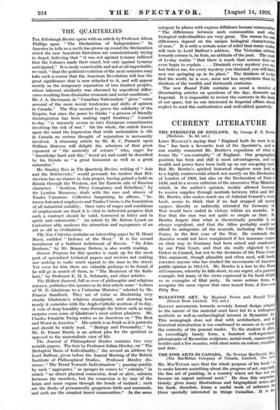THE QUARTERLIES
THE Edinburgh Review opens with an article by Professor Alison Phillips upon " The Declaration of Independence." In America he tells us a myth has grown up round the Declaration which the new American historians are conscientiously trying to dispel, believing that " it was not against tyranny inflicted that the Colonies made their stand, but only against tyranny anticipated." It is easily conceivable and not at all improbable, We read, " that the political evolution of the next centuries may take such a course that the American Revolution will lose the great significance that is now attached to it, and will appear merely as the temporary separation of two kindred peoples, whose inherent similarity was obscured by superficial differ- ences resulting from dissimilar economic and social conditions." Mr. J. A. Stevenson, in " Canadian Nationalism " gives " some account of the more recent tendencies and shifts of opinion in. Canada." The War seemed to prove the solidarity of the Empire, but since the peace he thinks " a process of friendly disintegration has been making rapid headway." Canada to-day " is intensely averse to (sic) European commitments involving the risk of war." On the whole, the article leaves upon the mind the impression that while nationalism is rife in Canada no serious thought of separation is necessarily involved. A charming article by. Mr. R. C. Punnett upon William Bateson will delight the admirers of that great exponent of " the austerity of science " who, eager for " knowledge hard and dry," loved art and could be described by his friends as " a great humanist as well as a great naturalist."
Mr. Stanley Rice in The Quarterly Review, writing of " Asia and the Bolshevists," would persuade his readers that Bol- shevism has no chance in Asia proper, having gained a hold on Russia through the Western, not the Eastern side of Russian character. " Sedition, Privy Conspiracy and Rebellion," by Sir Lyndon Macassey, deals with the uses and, abuses of Trades Unionism. Collective bargaining, he affirms, " be- tween federated employers and Trades Unions is the foundation of all industrial stability. Once rates of wages and conditions of employment are fixed it is vital to industrial progress that such a contract should be valid, honoured in letter and in spirit, and enforceable." An article by Mr. Bohun Lynch on Caricature ably analyses the attraction and repugnance of an art as old as civilization.
The New Criterion contains an interesting paper by M. Henri Massi, entitled " Defence of the West." It is the second instalment of a. brilliant indictment of Russia. " Sir John Denham," by Mr. Bonamy Dobree, is also worth reading.
Science Progress for this quarter is made up for the most part of specialized technical papers and reviews not making nor seeking to make much appeal to the man in the street. Yet even for him there are valuable pickings to be found, if he will go in search of them, in " The Bushmen of the Kala- hari," by Professor. E. H. L. Schwartz, and other articles.
The Ribber' Journal, full as ever of philosophic and religious interest, publishes this quarter as its first article some " Letters of W. E. Gladstone to a Unitarian Minister," selected by Mr. Francis Sandford. They are of value as illustrating very clearly Gladstone's religious standpoint, and showing how nearly it coincides with the Anglo-Catholic position of to-day. A vein of deep humility runs through the letters such as may surprise even some of Gladstone's most ardent admirers. Mr. Charles Franklin Twing writes as an American on " The Best and Worst in America." His article is as frank as it is patriotic and should be widely read. " Biology and Personality," by Mr. D. Fraser Harris is an ardent plea for the spiritual as opposed to the materialistic view of life.
The Journal of Philosophical Studies contains two very notable papers. The first by Professor Julian Huxley, on " The
Biological Basis of Individuality," the second an address by Lord Balfour, given before the Annual Meeting of the British Institute of Philosophical Studies. Professor Huxley dis- cusses " The Trend Towards Individuation" ; passing quickly by such " aggregates " as sponge; he comes to " colonies," in which " no direct physical connexion, dead or alive, subsists between the members, but the connexion is by way of the brain and sense organs through the bonds of instinct ; such are the flocks of permanently gregarious birds and mammals, and such are the simplest insect communities:" In the same
category he places with express diffidence human communitim " The differences between such communities and other biological individualities are very great. The reason for slid differences depend on the unique biological characteristic, of man." It is with a certain sense of relief that many reader will turn to Lord Balfour's address. The Victorian attitude towards science is, he feels, an attitude of the past. The youth of to-day realize " that there is much that science does not even begin to explain . . . Diminish every mystery you ean, but believe me, for every mystery you diminish you will find a new one springing up in its place." The thinkers of to-day find the world, he is sure, more not less mysterious than the thinkers of the twelfth and thirteenth centuries.
The new Round Table contains as usual a number of illuminating articles on questions of the day, domestic and Imperial. It is impossible to review the contents in the limits of our space, but no one interested in Imperial affairs should neglect to read this authoritative and well-edited quarterly.


































 Previous page
Previous page